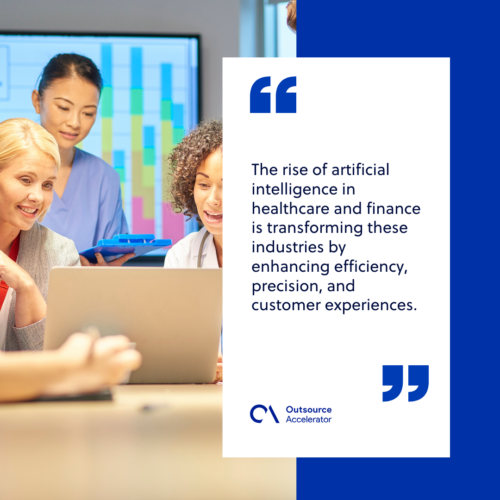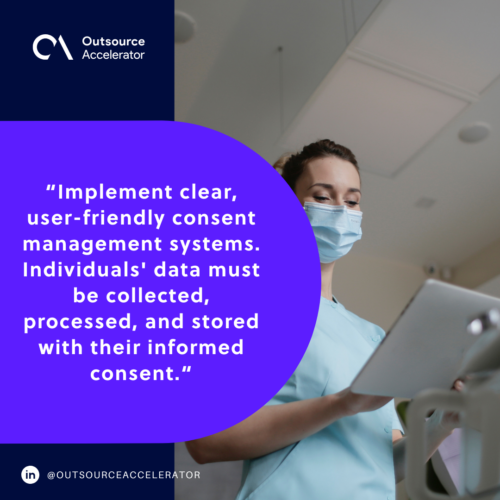Balancing AI innovation with data privacy in healthcare and finance

Artificial intelligence (AI) is rapidly reshaping industries like healthcare and finance, unlocking new opportunities for efficiency, personalization, and innovation.
AI’s potential is vast. However, as AI becomes more integrated into these sensitive sectors, it brings forward important privacy and security concerns. Balancing the drive for innovation with the need to protect personal data and comply with regulations is crucial.
In this article, we’ll explore the intersection of AI, data usage, and regulatory compliance (GDPR, HIPAA), offering insights into how businesses can navigate this uncharted territory responsibly.
AI innovation in healthcare and finance
The rise of artificial intelligence in healthcare and finance is transforming these industries by enhancing efficiency, precision, and customer experiences.
Here’s a brief overview of how AI is revolutionizing each sector:
AI innovation in healthcare
In healthcare, AI is improving patient outcomes, streamlining operations, and supporting medical professionals in making more informed decisions.
- Predictive analytics. AI models analyze patient data to predict disease outcomes, enabling earlier interventions and personalized treatment plans.
- Medical imaging. AI algorithms assist radiologists by analyzing medical images (e.g., MRIs, X-rays) for signs of disease, improving diagnostic accuracy and reducing human error.
- Patient care and management. AI-powered chatbots and virtual assistants help with patient inquiries, appointment scheduling, and health monitoring, making healthcare deliveries more accessible and efficient.
- Drug discovery. AI accelerates the drug development process by predicting molecular behavior, helping researchers identify promising candidates more quickly.

AI innovation in finance
Similarly, in finance, AI is enabling faster, smarter, and more personalized services.
- Fraud detection. In order to spot questionable activity, AI systems examine transaction patterns in real time. This helps prevent fraud and improves security for financial institutions and their customers.
- Algorithmic trading. AI-driven algorithms analyze market trends and make trading decisions at speeds beyond human capability, optimizing financial strategies and enhancing market efficiency.
- Personalized financial advice. AI tools use customer data to offer tailored financial advice, from investment strategies to budgeting. Individuals can manage their finances more effectively.
These advancements demonstrate AI’s profound impact, but they also highlight the need for careful attention to privacy, security, and regulatory compliance.
Privacy and security concerns related to AI innovation
The sensitive nature of the data handled in healthcare and finance—whether it’s medical records or financial transactions—raises the stakes for protecting personal information.
Below are some of the main privacy issues associated with AI in both sectors:
1. Data breaches
AI systems often rely on vast amounts of sensitive data. If these systems are compromised, they could lead to massive data breaches, exposing personal health records or financial data to unauthorized access.
2. Misuse of personal information
AI models require large datasets to be trained effectively. If not properly managed, this data could be misused for purposes outside of the intended scope, such as selling personal data or using it for unapproved commercial purposes.
3. Lack of transparency in AI decision-making
Many AI algorithms operate as “black boxes,” where it’s difficult to understand how decisions are made.
This lack of transparency raises concerns over accountability, especially when AI decisions impact people’s health or financial well-being.
4. Inaccurate data and bias
AI can sometimes be trained on biased or incomplete data. In turn, it may result in flawed results that can negatively impact individuals, whether it’s misdiagnosing a medical condition or providing poor financial advice.
Strategies for AI adoption and data privacy compliance
AI innovation must comply with privacy regulations like GDPR and HIPAA. Here are key steps businesses in healthcare and finance can take for successful adoption
- Data encryption and anonymization. Implement strong encryption to protect sensitive data during storage and transmission, and anonymize personal information to reduce the risk of exposure.
- Regular audits and compliance checks. Conduct routine audits so AI systems are compliant with privacy laws and internal policies. This includes reviewing data access logs, user permissions, and compliance with consent protocols.
- Engage with legal and data privacy experts. Collaborate with legal and data privacy professionals to navigate regulatory requirements. Make sure AI systems adhere to GDPR’s consent, transparency, and data rights provisions, and HIPAA’s security standards for healthcare data.
- Robust consent management systems. Implement clear, user-friendly consent management systems. Individuals’ data must be collected, processed, and stored with their informed consent.
- Train AI models with minimal data. Use only the necessary, anonymized data to train AI models, ensuring data minimization and reducing exposure to sensitive information.

Adopting AI responsibly requires technological advancement, including deep understanding of privacy regulations and security practices.
Working with leading third-party solutions providers like Acquire BPO can help businesses navigate these complexities by providing AI systems that are secure, compliant, and efficient.
Partner with Acquire BPO to ensure your AI solutions are compliant, secure, and future ready!







 Independent
Independent




